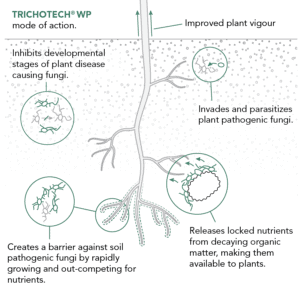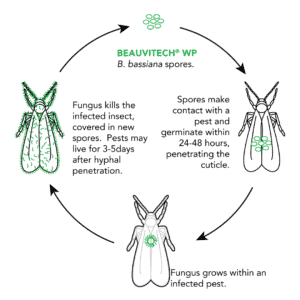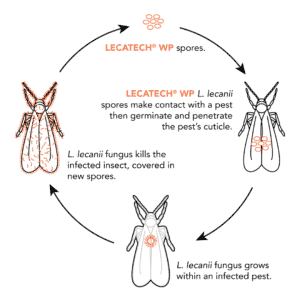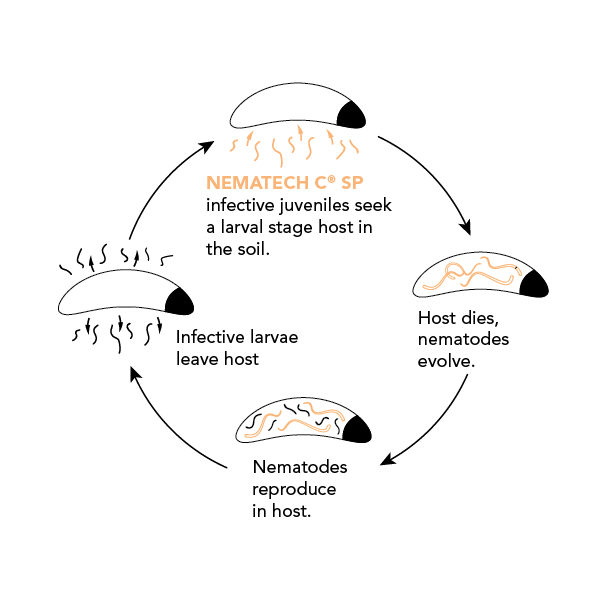A key to unlocking the potential of a crop is buried in the upper layers of the soil. Living within soil water pockets are worm-like micro-organisms called nematodes (phylum Nematoda). These tiny creatures amass large populations and in agriculture, they can help or hinder. Some nematodes are plant-parasitic (or PPNs for short), causing over $100 billion in crop damage annually, while others are beneficial, holding enormous potential for sustainable crop protection or helping make nutrients more readily available to plants.
By Cory Smit and Catherine Gacheri
Nematodes are some of the most abundant animals on Earth. Nematology, the study of nematodes, is vast, having identified over 28 thousand species to date, many with feeding habits which are important in agriculture. Fortunately, there are a few fundamentals that farmers can use to simplify and act on the information.
- Some nematodes are crop pests, feeding on or infecting roots, bulbs or leaves. The image above is a typical example of a Root-Knot Nematode or Meloidogyne spp. infection of roots. (Photo: Scot Nelson, 2017. Meloidogyne incognita on Solanum lycopersicum.).
- Some nematodes are beneficial in killing crop pests and while others help unlock nutrients.
- Routinely monitor nematodes in all growing areas using professional nematode analysis, and deploy the recommendations.
- Nematodes reproduce quickly and in massive numbers – good news if they are beneficial, bad news if they are pests.
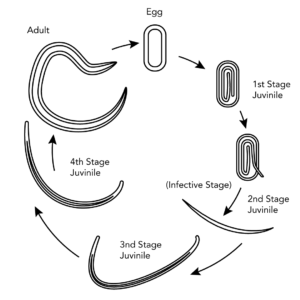
Fig. 1. Typical nematode lifecycle. Duration depends on species and other factors.
Do nematodes speed up the release of nutrients?
The interplay between bacteria, fungi and beneficial nematodes that feed on them can contribute to the supply of nitrogen and accelerate the mineralization of untapped organic nutrients. By consuming the bacteria and fungi which break down compost within the soil, these nematodes can speed up the release of nitrogen into the soil by releasing excess nutrients, making it available for crops to use.
Tip: Growers can stimulate this process by incorporating manure and compost into the soil to provide a habitat for bacterial and fungal colonies to grow in, making new food for the beneficial nematodes
Can nematodes be used as Biocontrols?
Dudutech’s research and development of nematodes as biocontrols take advantage of species which kill crop pests, called Entomopathogenic Nematodes (EPNs). EPNs find and kill their target pest to use in their reproductive cycle. Using EPNs helps growers reduce their reliance on chemicals which may unintentionally harm the soil ecology and non-target beneficial micro-organisms.
Using research on their host range, Dudutech developed four nematode-based products to tackle key pests. These include:
- NEMATECH® S – Steinernema feltiae D2 – for Thrips and Sciarid Flies,
- NEMATECH C – Steinernema carpocapsae – for Cutworm,
- NEMATECH H – Heterorhabditis bacteriophora F27 – for beetles,
- SLUGTECH – Phasmarhabditis hermaphrodita M1 – for slugs and snails.
The ability of infective juveniles to quickly seek out and kill their target before spreading to new hosts makes these beneficial nematodes powerful agricultural tools for the sustainable management of a wide variety of crop pests. In particular, nematodes are widely used in integrated pest management of Thrips.
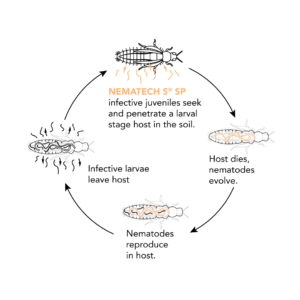
Fig. 3. Nematech S SP mode of action.
Due to their complex lifecycles, no single control option can provide satisfactory control of Thrips. If any part of their lifecycle is left unmanaged, the populations can become “resident” and quickly boom, causing significant damage to crops.
In most cases, Thrips infestations in greenhouse crops are from resident populations.
Most thrips species including Western Flower Thrips (WFT, Frankliniella occidentalis) spend up to one-third of their lifecycle in the soil. When used with above-ground predators, such as AMBLYTECH and MONTECH, and traps (STICKTECH), the nematodes in NEMATECH® S play an important role underground in the biocontrol strategy by killing Thrips in their soil-living stages.
How can farmers sustainably manage plant-parasitic nematodes (PPNs)?
PPNs are crop pests, causing lesions, cysts and rot in the root system. Blue, yellow and red (Toxicity Classes 3 through 1 a and b) chemical nematicides pose numerous problems with far-reaching effects for growers and consumers including the development of nematicide resistance, exceeding residue limits (MRLs) and negative effects on non-target organisms. These issues have far-reaching effects for farmers as they make pesticide applications more expensive, restrict access to markets and harm beneficial nematodes living alongside pest nematodes.
To help growers tackle these nematodes in a sustainable way, Dudutech has paired MYTECH® and NEMguard. MYTECH® contains a powerful nematophagous fungus (Paecilomyces lilacinus) which selectively targets plant-parasitic nematodes. Mytech kills all life stages of most plant-parasitic nematodes. The fungal spores on treated crops attach to their target and form mycelia on the host, feeding on it before releasing spores to begin the cycle over.
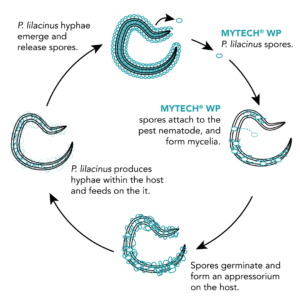
Fig. 4. Mytech mode of action.
NEMguard® is a powerful environmentally intelligent nematicide containing plant-sourced ingredients which can be used to control PPNs. The (proprietary) polysulphides contained in NEMguard rapidly cause oxidative stress and kills PPNs. Due to their biology, beneficial nematodes are less affected by NEMguard when compared to routinely used broad spectrum nematicides which may damage the environment.
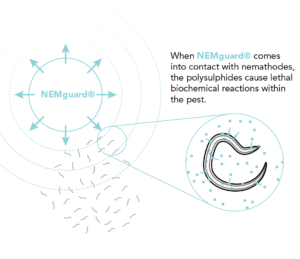
Fig. 5. NEMguard SC mode of action.
The soil beneath crops is a complex but delicate ecosystem. By looking after it sustainably, growers can take advantage of the plant health benefits afforded by healthy soils.
Interested in finding out more?
Click here to send us a message or use our chat channel on our website.

